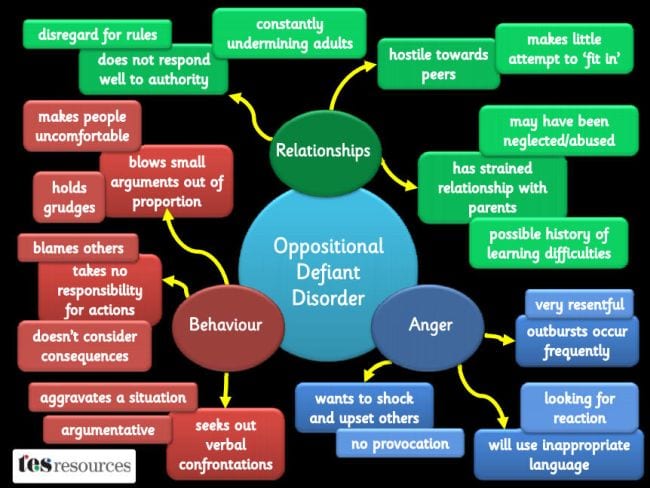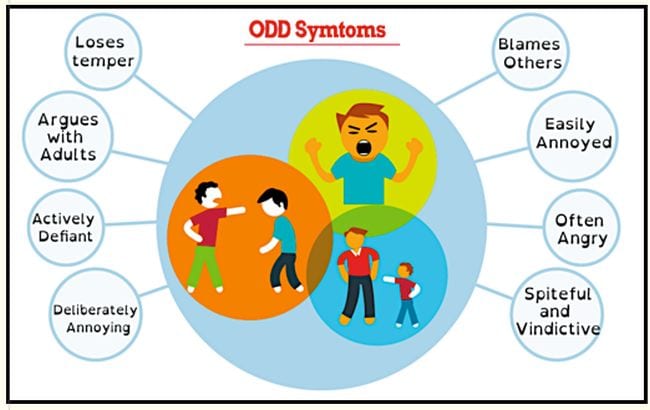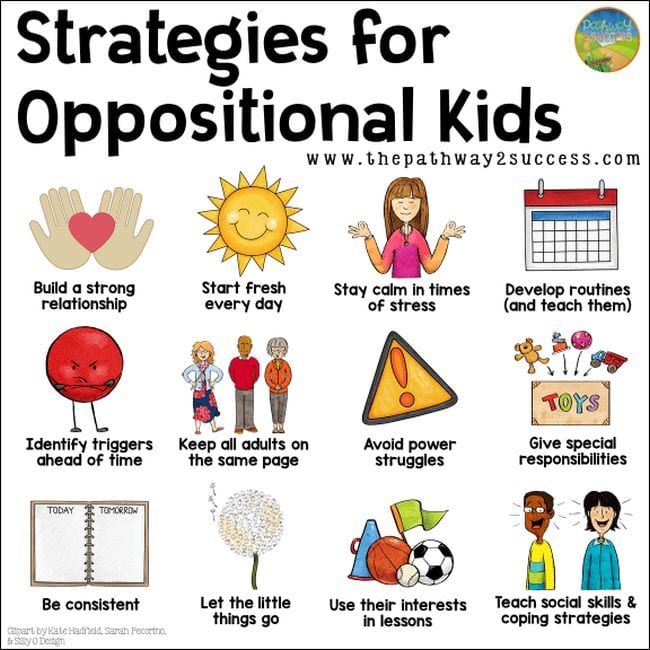[ad_1]
Third quality instructor Ms. Kim is genuinely battling with her university student Aiden. Every working day, he argues over straightforward issues, seemingly just for the sake of producing difficulty. He refuses to just take duty for his habits, even when caught in the act. And now, Aiden tore up a fellow student’s artwork undertaking soon after that college student would not let him use their purple marker. His moms and dads say he’s the similar at home. A college counselor finally indicates that many of these behaviors line up with the signs or symptoms of ODD in kids—oppositional defiant disorder.
What is oppositional defiant disorder?

Picture: TES Resources
Oppositional defiant disorder, generally recognised as ODD, is a behavioral disorder in which small children are—as the title suggests—defiant to the degree that it interferes with their day-to-day life. The DSM-5, printed by the American Psychiatric Affiliation, defines it as a sample of angry, vindictive, argumentative, and defiant behavior that lasts at the very least 6 months.
In an article on Headteacher Update, Dr. Nicola Davies sums it up this way: “The goal of a university student with oppositional defiant ailment (ODD) is to attain and maintain control by screening authority to the limit, breaking policies, and provoking and prolonging arguments. In the classroom, this can be distracting for the two the instructor and other pupils.”
Involving 2 and 16 percent of the population may have ODD, and we’re not fully sure of the results in. Scientists believe it could be genetic, environmental, biological, or a combine of all 3. It’s identified extra usually in young boys than women, nevertheless by their teen yrs, both of those seem to be similarly afflicted. It co-takes place in a lot of kids with ADHD, with some scientific studies indicating up to 50 percent of college students with ADHD also have ODD.
What does ODD in young children look like?

Graphic: ACOAS
We all know that children of a certain age, particularly toddlers and teens, are quite a great deal usually arguing and defying. In truth, individuals can be appropriate behaviors at individuals ages, as kids examination the environment close to them and discover how it is effective.
Nevertheless, ODD is a entire whole lot much more than that, to the position exactly where college students with ODD disrupt their have lives and frequently the lives of anyone all over them. Little ones with ODD drive the restrictions of defiance much over and above cause. Their issue behavior is substantially extra excessive than that of their peers, and it transpires substantially additional typically.
Defiance and arguing
Most young children go by a phase the place “no” is their favored word, but for students with ODD, that stage hardly ever finishes. They question all the things, all the time, and constantly refuse to comply with guidelines and requests. Their need for argument may perhaps direct them to deliberately annoy other folks in an attempt to create conflict. Having said that, they commonly refuse to get responsibility for their issues or behaviors, blaming other folks for everything.
Anger and irritability
These are the little ones who seem to be indignant all the time and fly off the manage at the slightest provocation. Their overreactions could devolve into mood tantrums, not just occasionally but regularly. Hence, every discussion you have with them would seem to be a wrestle.
Vindictiveness
The ongoing anger of young children with ODD can guide to vindictiveness and a want for revenge. They are spiteful and retaliatory, keeping grudges and demanding punishment for other individuals.
Not amazingly, these behaviors bring about pupils with ODD to struggle equally at residence and in faculty. It is challenging for them to make pals, and their schoolwork normally suffers, also. They may become frustrated or anxious, or develop carry out or material abuse issues as they mature older. Early identification and remedy are vital to assisting these kids.
How can academics support young children with ODD?

It is important that academics and dad and mom work jointly to assistance students with ODD. The professional lecturers in the WeAreTeachers Helpline group on Facebook recommend making an attempt these solutions at university and at residence. Uncover additional tips at Pathway 2 Success.
Be consistent
“Instead of arguing, repeat your phrases and penalties,” claims Brandy T. “I use set off terms that I often repeat so the pupil understands I necessarily mean enterprise. If a scholar attempts to argue, I basically say either ‘not now,’ ‘later,’ or ‘fix the situation!’ The pupil then is aware they can go to their chill-out place if they need to have to relaxed down.”
Give them house to reset
Young children with ODD can study to understand when they are emotion overcome and obtaining prepared to challenge or defy. Giving them a secure room to quiet down and rethink their possibilities can be beneficial. Quiet-down corners have grow to be common in lecture rooms for this very cause. “Put out publications, coloring, LEGO bricks, and many others., in a place where they can go on their very own when they come to feel like they require a break,” says Tobey G. “Often instantly soon after things to do with a lot of stimulation, these young children need to have a secure space to quiet down. Allow them decide if and when they want to excuse by themselves.”
Give them choices
Young children with ODD are hunting for command. Fairly than permitting them travel the situation, you can give them a feeling of management though sustaining control oneself. “Always give options,” advises Holli A. “State your choices—then walk away. Give the college student time to process and decide which choice to make. If they really do not like the possibilities, never have interaction. When they consider to argue, repeat the possibilities, and stroll absent once more. If the university student nonetheless will not choose, they do not get to take part in their desired activity.”
As in other circumstances, it pays to remain dependable in your classroom policies and willpower. “After I give options, I generally reinforce the classroom regulations and treatments and stick to up with an proper consequence,” says Kristel R. “You can not falter adhere to your regulations and follow by.”
Offer optimistic reinforcement and proper benefits
Children with ODD frequently answer to constructive habits reinforcement. It’s practical to offer them a possibility to receive specific privileges, fairly than using those people privileges away as punishment. For occasion, give them the capacity to earn display screen time when they immediately do as they’re questioned, as an alternative of threatening to take absent screens when they defy.
When using a reward program, make sure that it is acceptable and is not perceived as manipulation. Leslie L. uses a habits tracking system and a reward system exactly where students can convert in points for an incentive (iPad time, lunch with a trainer, and so forth.). “I also build breaks appropriate into their program,” adds Leslie. “And I consider to be as patient and being familiar with as I probably can.”
Instructor Erica M. also takes advantage of a issue system checklist with possibilities A & B. If they do each and every a single, they receive “points” for an incentive, which typically is iPad time all through the past 15 minutes of course. “Find an fascination and use that to your gain!” Erica says.

Avoid energy struggles
Most teachers agreed: Stay out of all those winless energy struggles. As Kris W. explained, “Pick your battles. A college student of mine corrects me all the time, no matter if I am improper or not. I remedy again, ‘OK, let’s double-look at that.’ If I manufactured a mistake, I appropriate it, and we move on if he’s mistaken, I silently let him figure it out.”
Make own connections
Typically young ones with ODD are hunting for a relationship with a instructor who can assist them deal with complications on their individual alternatively of generating them stand out in a adverse way. Creating a relationship with them will aid get to the root of the actions.
“Almost all of my learners have ODD, and I have a excellent relationship with most of them,” claims Kendra J. “Find out what they are fascinated in and have conversations on their degree all through breaks.” Allow them to set plans and choose together what the outcomes will be if they really do not meet up with the aim.
Carol H. says, “Find a thing at the student’s curiosity degree. I at the time had a middle college woman that hated all of her teachers and was out of regulate. She would curse at adults and friends, scratch, bite, and refuse to entire operate. I uncovered out she performed soccer for a journey group. So did my son. A couple months into the faculty year, she had a video game adjacent to my son’s, and I was equipped to view her perform. It modified every little thing. She is a freshman in faculty now, and we continue to preserve in contact.”
Find ODD sources.
This is just an overview of what pupils with ODD are going through. Teach yourself about the ailment to come across a lot more techniques to fully grasp and help these kids in your classroom.
On-line:
Publications:
(Just a heads up, WeAreTeachers may acquire a share of income from the e book inbound links on this website page. We only advise goods our crew loves!)
Have a lot more queries about ODD in young children? Appear share your ideas and ask for advice on the WeAreTeachers Helpline Fb team.
Plus, snag this totally free printable: 11 of the Greatest Classroom Administration Faults (Furthermore How to Correct Them).
[ad_2]
Resource link




More Stories
It’s Time to Embrace the Emotional or Affective Turn
How to Improve Employee Productivity
Administrative Advocacy with Laurie Chang and TpT School Access